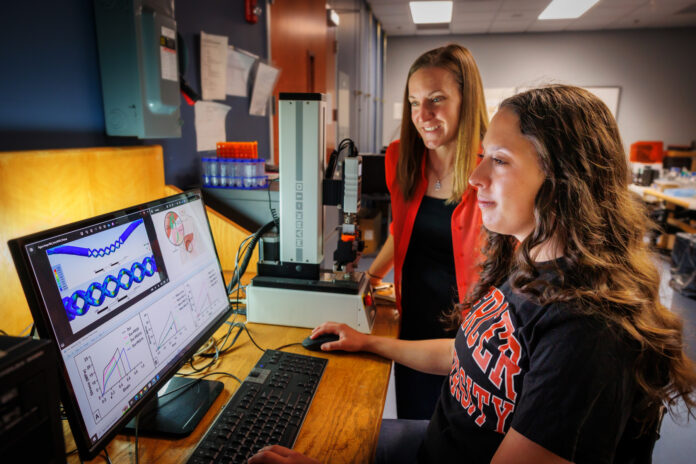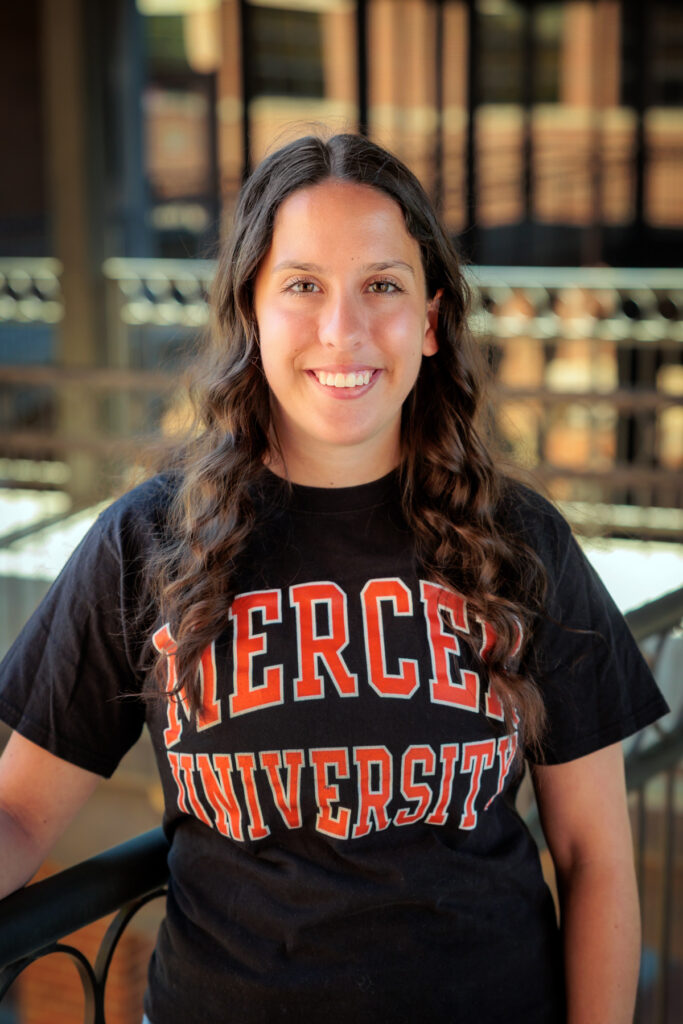
Mercer University rising senior Ainsley Westbrook hopes to combine her passions for biomedical engineering and neuroscience to research new medicines for diseases that target the brain.
She was driven to this work after her grandmother died of dementia, which prompted discussion among her family about medicine and the brain.
“The questions and the conversations have really made me interested in neuroscience and understanding more about the pathways of degradation in dementia and how meds are affecting that and how meds are targeting different things in the brain,” she said. “I think there are just so many questions to ask.”
Westbrook is among three Mercer students awarded this year’s Barry M. Goldwater Scholarship, the nation’s most prestigious scholarship for undergraduates in science, mathematics and engineering. Rising seniors Wesley Kinney and Isabella Phillips also received the award.

“The Goldwater Scholarship has been something I’ve worked toward for a while,” Westbrook said. “I came to Mercer to pursue research, and it is rewarding to actually get recognized for my research.”
A biomedical engineering major, Westbrook works in the labs of Dr. Joanna Thomas, associate professor of biomedical engineering, and Dr. Katie Northcutt, professor and director of the neuroscience program at Mercer.
In Dr. Thomas’ lab, Westbrook tests biliary stents for product safety. A biliary stent is a straw-like tube placed in a bile duct to hold it open after it has been blocked or partially blocked.
“I have developed a 3D model of a biliary stent, and I applied forces that would be similar-type forces as they would be during deployment,” she said. “I measure stress, strain and deformation in order to ensure that it is within safety limits so that the biliary stent will not fracture, break or permanently deform during deployment.”
Westbrook said she’s learned so much from working in the lab.
“I’ve learned to problem solve, think on my feet, be able to take information from very technical sources like different research articles and be able to tailor it to what we’re looking at,” she said. “I’ve learned so many different communication skills to be able to communicate within our team and then to communicate with outside sources.”
In Dr. Northcutt’s lab, Westbrook studies how postnatal hypothyroidism affects anxiety, compulsivity, impulsivity and cognition in young rats. To do this, the research team induces hypothyroidism in the mother rat, who then passes it on to her pups through her milk.
The team is using the rat model to mimic a phenomenon in humans, Dr. Northcutt said.
“It’s quite common for people to experience hypothyroidism while they’re pregnant. Sometimes people already have it when they get pregnant, but also pregnancy can put stress on your thyroid gland,” she said. “But all the symptoms of hypothyroidism sort of mimic pregnancy symptoms, so like you’re extra tired and you’re gaining weight. Sometimes you miss that because those are things you would expect when you’re pregnant anyway.
“And there have been some reports of increased rates of kids having ADHD (attention-deficit/hyperactivity disorder) and autism when their mother had hypothyroidism during pregnancy, but we don’t know a whole lot about it. We don’t really know what’s going on in terms of if it might be altering brain development, so we’re trying to mimic that in a rat model to learn a little bit more about some of the impacts.”
As a biomedical engineering major, Westbrook brings a unique perspective and creativity to the lab, which typically consists of neuroscience, biology and psychology majors, Dr. Northcutt said.
Westbrook’s duties include taking care of the rats, conducting behavioral analysis and analyzing videos of behavioral tests. She also traveled with Dr. Northcutt to the Society for Behavioral Neuroendocrinology’s 2024 conference, where Westbrook presented an aspect of the project.
In addition to her unique skillset, Westbrook brings a positive outlook to the lab, Dr. Northcutt said.
“She’s fun to have around, too, which is always good when you get sort of bogged down in the tedious aspects of research,” she said. “It’s just really nice to have her personality be part of the group as well.”
Westbrook is a recipient of the engineering honor society Tau Beta Pi scholarship and a member of the Alpha Delta Pi sorority. After graduation, she plans to pursue her Ph.D. in biomedical engineering with a focus in neuroscience.








